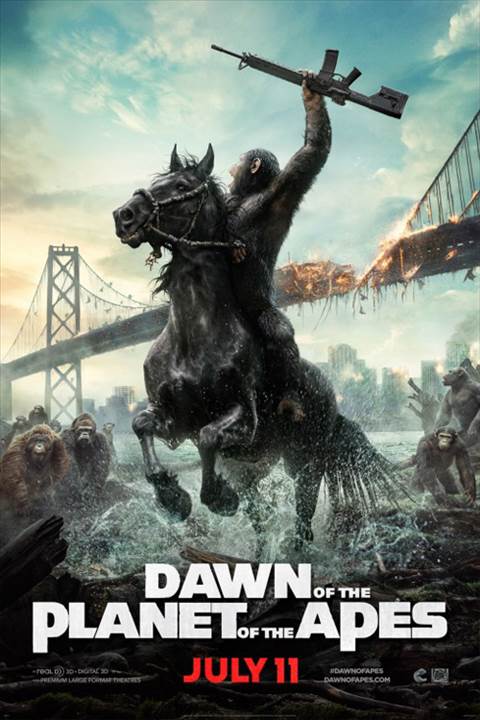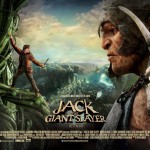Look this one is pretty obvious thematically speaking, amiright? We can all agree on this much. As a continuing allegory for the age old inability of the human race to work together in peace and harmony and without hurting each other, “Dawn of the Planet of the Apes” hits all the most obvious albeit important notes over and over, those about the importance of family and the duality of man and the conundrum of how our survival instinct can lead to our own downfall. In the most simplest of terms, after everything is left in shambles and on fire and smoldering with the specter of violence of death draped over the world, the most important question is asked: Can’t we all just get along?
“Dawn of the Planet of the Apes” is not an excellent movie because of the top notch and often stunning visual effects or because of the well crafted and interesting action scenes but instead it is excellent because of how the movie is properly made from start to finish, with each scene moving the story forward, either via advancing the plot, the themes or the characters, often times simultaneously, and it makes for a fast moving, engaging and interesting summer blockbuster. Entire scenes consist only of computer generated characters, communicating often in soft grunts and sign language, yet thanks to some bold yet beautiful strokes, so much information is given that it allows us to actually get to KNOW these characters, and to understand their wants and needs, and this is a beautiful thing.
Storywise, the movie takes place about ten years about the fall of the human race, which was caused by a virus created in a lab which made apes smart and killed most people, leaving the rest to fight between themselves just to survive. All of this happens before the movie really even starts. And then it’s the story of two colonies – one led by super ape Caeser (Andy Serkis) out in the woods, and one led by normal human Dreyfus (Gary Oldman), who has somehow found himself tasked with protecting what appears to be only a few hundred people holed up in an unfinished building in the middle of San Francisco.
They are running out of gas to run their generators and they need to get a hydroelectric dam working to get power to the city so they can try to put the pieces back together. The problem is that the dam is in ape territory, and while Caeser is ultimately trusting of the humans, especially this dude Malcolm (Jason Clarke), there are some apes who don’t trust the humans (while Dreyfus, while not immediately distrusting of the apes, sees no problems with fighting the apes to get what he feels necessary). So we end up with a total Dr. Martin Luther King Jr. versus Malcolm X type of thing; Caesar starts out the movie with Koba (Toby Kebbell) at his side, both of them simply looking out for all ape-kind, but when the Fear of the Other comes in via the return of the oppressive humans, they differ in their views on how to handle the situation, with Koba much hungrier for a fight and a chance to exact some revenge on his former tormentors, and this drives a wedge between them as well as drives this story strongly forward.
Then there is the characterization of the movie, rounding out the story and giving it a little bit of weight. Here it is done by showing the similar family dynamics between the ape community and the human community, and the heavy emphasis on the important of family stressed by the characters. Malcolm has his son that he’s trying to raise in this horrible world, and Caesar has his son that he is trying to raise into a strong and heavy and smart adult. The relationship between the apes is a little more developed and explored than the one between Malcolm and his kid, as they get along pretty great for the whole time and really don’t have any problems as a father-son dynamic, whereas Caeser’s kid is at a somewhat rebellious stage, anxious to branch out on his own already, refusing to listen to his dad when he just wants to give him some advice.
It also helps that we understand that Dreyfus isn’t really a bad guy at all, he’s actually quite sympathetic, he’s just doing what he feels is in the best interest of the people he wants to protect and save, and it’s hard to argue with this character because in many ways he is right. Koba, meanwhile, is a little more treacherous by the end, so while his early misgivings about the humans are totally legit, the idea of obtaining power and having the apes follow him instead of Caesar becomes a corrupting force, which then puts this one character as the only real “bad guy” of the movie.
Oh yeah, did I mention that the effects are incredible? Because they are. Don’t believe me? Do a Google search, you’ll pull up hundreds of thousands of words about how awesome the effects are.
But it’s all about much more than that, and it all works very well. This is a great movie, a strong summer film, and one of the best installments in one of the most unlikely of film franchises ever.


 #532 – Plant Them Seeds
#532 – Plant Them Seeds Crespodiso Film School – Bruce Lee
Crespodiso Film School – Bruce Lee Review: ‘Jack the Giant Slayer’
Review: ‘Jack the Giant Slayer’ Spoiler Bonus Episode – Star Wars: The Last Jedi
Spoiler Bonus Episode – Star Wars: The Last Jedi
Leave a Reply
You must be logged in to post a comment.